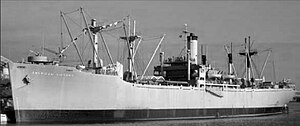SS Maritime Victory

VC2-S-AP2 type ship
|
|
| History | |
|---|---|
| Name: | SS Maritime Victory |
| Builder: | Bethlehem-Fairfield Shipyard, Baltimore |
| Launched: | May 1945 |
| Acquired: | 18 June 1945 |
| Renamed: | USAT Pvt. Frederick C. Murphy, 1950 |
| Fate: | Beaumont Reserve Fleet (until April 2006); awaits scrapping summer 2006 in Brownsville, Texas |
| General characteristics | |
| Type: | Victory ship |
| Displacement: | 7,607 long tons (7,729 t) |
| Length: | 455 ft (139 m) |
| Beam: | 62 ft (19 m) |
| Draft: | 28 ft 6 in (8.69 m) |
| Propulsion: | Allis-Chalmers cross-compound steam turbine with double reduction gears, 6,000 hp (4,474 kW) at 100 rpm |
| Speed: | 17 knots (31 km/h; 20 mph) |
| Range: | 23,500 mi (37,800 km) |
| Capacity: | 500,000 cubic feet (approx.) |
| Complement: | 62 Merchant Marine and Navy Armed Guard |
| Armament: | |
SS Maritime Victory, hull number 821, VC2-S-AP2/WSAT, renamed USAT Pvt. Frederick C. Murphy, was an American Army troop transport which saw duty just after World War II.
The Maritime Victory was unusual in that as an AP2 vessel, the cargo holds were converted for troop berthing (though with reduced cargo-carrying ability) and topside cargo handling gear was retained. A total of 97 such VC2-S-AP2 conversions were planned, 84 completed.
On July 5, 1946 the ship was returned to the U.S. Army. On August 30, 1946 it was put into the reserve fleet and renamed USAT Pvt. Frederick C. Murphy on February 10, 1950 the in honor of World War II Medal of Honor recipient Frederick C. Murphy.
As one of the last surviving ships of her kind she received extensive documentation by the National Park Service in 2006, which produced the archival record Private Frederick C. Murphy HAER Report.
She was launched at the Bethlehem-Fairfield Shipyards on Tuesday, 22 May 1945, sponsored by J. Buell Snyder, wife of Congressman Snyder. Delivered on 18 June 1945, she was transferred to the Army War Department as an Army Transport. She was operated under contract by the American South African Line.
The Maritime Victory was delivered to the USAT as a transport in June 1945. The ship made several crossings carrying troops from the European Theater of Operations, especially between Le Havre and New York. From Le Havre she often left from the area known as the Cigarette Camps as part of Operation Magic Carpet to take US troops home.
...
Wikipedia
